Archives
-

Jacques Derrida, vent'anni dopo (vol. 1)
Vol. 18 No. 2 (2025)A vent’anni dalla scomparsa di Jacques Derrida, la sua eredità filosofica non smette di interrogare incessantemente la nostra attualità, attraversando i più svariati domini teorici, culturali, sociali e politici. Il presente volume, così come il successivo, si pone l’obiettivo di saggiare questa eredità, mostrando la fecondità inesauribile del gesto di pensiero della decostruzione.
Più che un metodo di analisi precodificato, o una maniera univoca di interpretazione di testi o fenomeni, la decostruzione è una postura, un’esigenza, uno stile di pensiero che mira a mettere in questione, sempre con fare affermativo, ogni aspetto del reale, debordando qualsiasi possibile schematica applicazione.
«L’eredità non è mai un dato, è sempre un compito. Che resta davanti a noi, incontestabilmente, al punto che, prima ancora di volerlo o rifiutarlo, noi siamo degli eredi, e degli eredi in lutto, come tutti gli eredi». -

Gianni Vattimo: Destini di una filosofia (vol. 2)
Vol. 17 No. 1 (2025)Le eredità del pensiero di Gianni Vattimo vanno spesso al di là dei confini più facilmente prevedibili. Trópos ha scelto la nozione di “destino”, più densa e aperta della semplice eredità, per indicare gli ambiti in cui la filosofia di Vattimo è tuttora parte del dibattito contemporaneo. Dopo il volume precedente, dedicato alla politica, alla tecnica e alla filosofia in generale, questo secondo volume completa il discorso focalizzandosi sulla religione e sull’estetica. Si va così da saggi su temi teologico-politici a interventi più strettamente dedicati alla filosofia della religione, dall’estetica come filosofia dell’arte alla riflessione sull’esperienza in generale. Programmaticamente o meno, tutti i saggi condividono l’idea che la gerarchia aristotelica dei saperi – la filosofia prima vs le filosofie seconde – abbia fatto il suo tempo: religione ed estetica non sono più concepiti come ambiti “secondari”, ma luoghi del pensiero a partire dai quali si contesta la metafisica e si ridefinisce la filosofia come pensiero non fondazionalista.
-
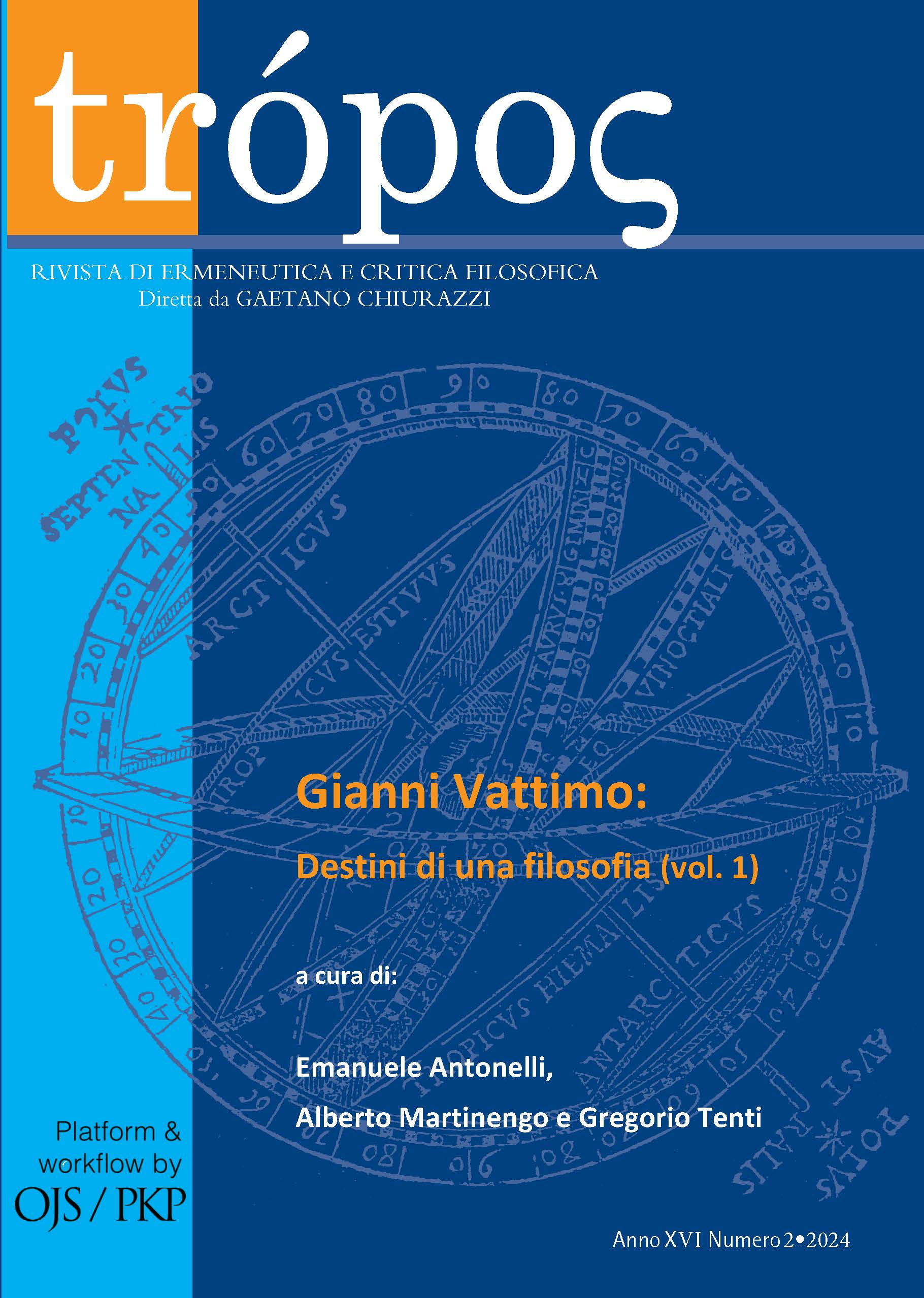
Gianni Vattimo: Destini di una filosofia (vol. 1)
Vol. 16 No. 2 (2024)Il presente volume, così come quello che lo seguirà, ricostruisce sotto diverse prospettive il pensiero di Gianni Vattimo, che ha fondato e diretto con Gaetano Chiurazzi questa rivista fino alla sua scomparsa. Nel tentativo di restituire almeno in parte la complessità del suo pensiero, i contributi qui raccolti affrontano alcune delle discipline che l’opera di Vattimo ha toccato: la teoria dell’Essere e della verità, la filosofia politica e il pensiero della tecnica, l’estetica, la filosofia della religione. Ciò che lega insieme questa molteplicità di interessi è anzitutto uno stile di pensiero che ha animato una critica della modernità di riconosciuta importanza attraverso la lente di una filosofia ermeneutica a vocazione anti-metafisica e nichilistica. Il portato più profondo di questo stile che – ci pare – le categorie del “pensiero debole” e del “postmoderno” non riescono a restituire fino in fondo rimane ampiamente attuale, anzi aperto al futuro: contribuire alla discussione intorno alla filosofia di Vattimo significa infatti entrare in contatto con alcuni dei fili rossi più presenti nella contemporaneità, dal problema della verità nel discorso tecno-scientifico alla possibilità di rapportarsi con realtà sociali via via più complesse, dall’idea di Europa all’emergere dei nuovi miti estetici. Questo volume, dunque, non vuol essere tanto un omaggio, ma piuttosto l’indicazione di alcune strade per proseguire il dialogo con la sua eredità intellettuale.
-
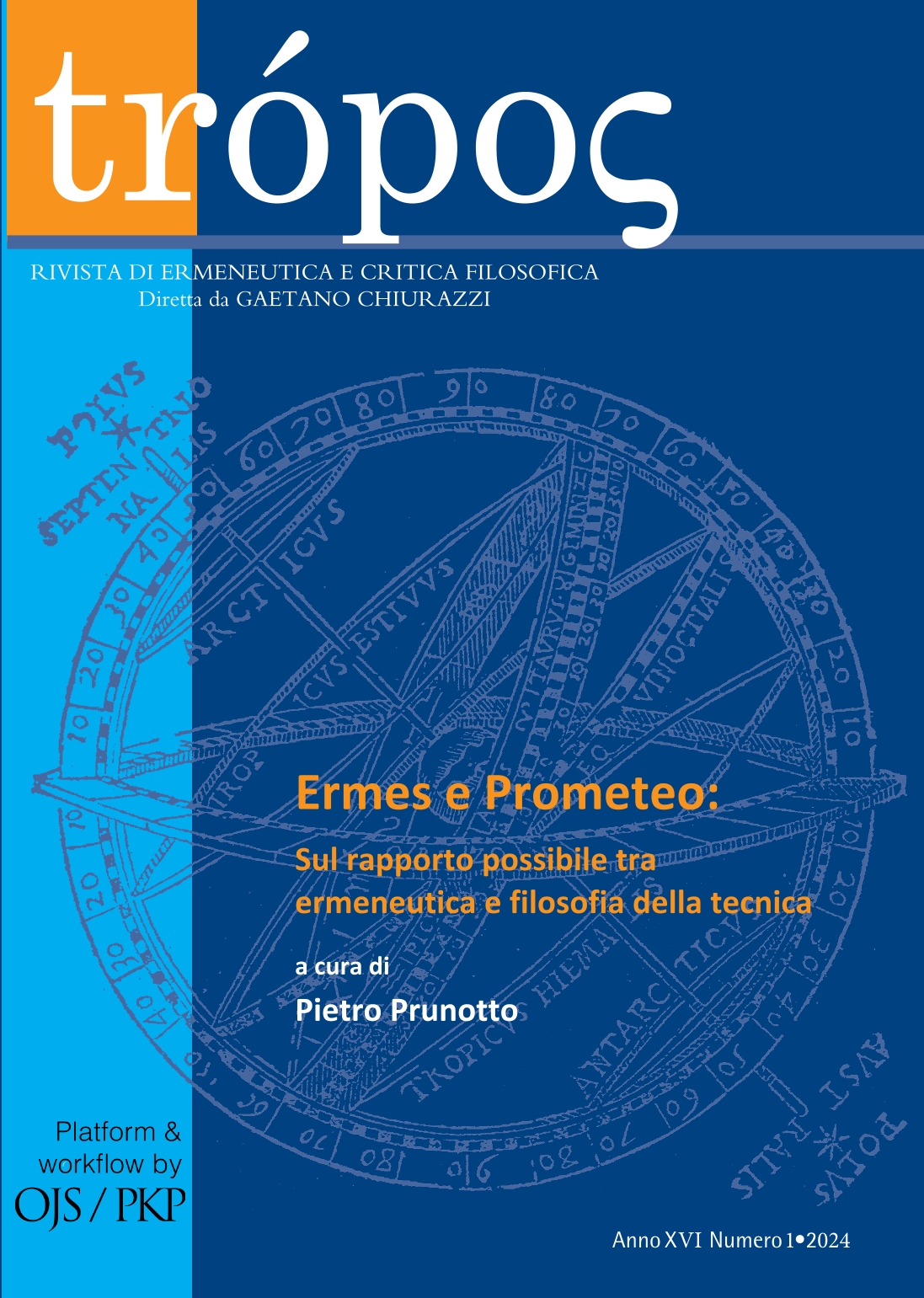
Ermes e Prometeo: sul rapporto possibile tra ermeneutica e filosofia della tecnica
Vol. 16 No. 1 (2024)Tra i miti dell’Occidente, quello di Prometeo spicca per importanza e ricchezza, incentrandosi intorno alla genesi stessa dell’essere umano che, grazie al dono della tecnica, si distingue tanto dal divino quanto dall’animale. In questo senso, l’apporto teorico della figura del Titano, e quindi del mito, starebbe nella delineazione dell’uomo come essenzialmente tecnico, che ritrova nel dono di Prometeo il suo tratto distintivo. Grazie alla tecnica, identificata nel Titano, si assisterebbe all’emersione di un nuovo spazio dove si insedia la vicenda storica dell’uomo.
Tuttavia, a tal fine – e seguendo il Protagora platonico – Prometeo non basta. È necessaria anche un’altra figura: Ermes, dio eponimo dell’ermeneutica. Seguendo la versione platonica il dono del Titano non salva l’uomo, che rimane disperso e incapace di vivere in comunità. Sarà soltanto l’arrivo di Ermes in un secondo momento che, tramite la tecnica politica, permetterà agli uomini di vivere insieme e quindi di avere effettivamente storia. Questa è, ad esempio, la lettura offerta da Bernard Stiegler: Ermes rappresenta il carattere propriamente ermeneutico di un pensiero che si interroga sull’origine dell’essere umano. In questo senso, dunque, non sarebbe sufficiente concentrarsi solo sull’aspetto tecnico-prometeico per comprendere l’umano, ma questo andrebbe concepito come intrecciato al necessario momento simbolico, a cui sarebbe connessa la natura storica, e quindi di senso, di ogni produzione umana. Tuttavia, questo non è l’unico modo di intendere il rapporto tra queste due figure: nel Prometeo incatenato di Eschilo, infatti, Ermes compare in prima linea tra gli aguzzini del Titano, cercando di punirlo ed estorcergli il segreto che reca con sé, finendo però sconfitto in astuzia. In questa versione, Ermes assumerebbe il ruolo di custode e protettore di un ordine ormai superato proprio dalla novità e dalla sfida posta dal Titano, rendendo così problematico il rapporto tra ermeneutica e filosofia della tecnica.
Assumendo queste due figure come i rappresentanti rispettivamente della filosofia della tecnica e dell’ermeneutica, la domanda circa il loro rapporto è ciò da cui muove il seguente volume di Trópos: filosofia della tecnica ed ermeneutica possono porsi in dialogo? In che modo? In caso di risposta affermativa, in che modo andrebbero riletti l’aspetto ermeneutico e tecnico dell’umano? Il fatto che Ermes giunga dopo Prometeo indica, al di là della prospettiva stiegleriana, l’impossibilità di una filosofia della tecnica senza ermeneutica? Oppure Ermes rimane, come in Eschilo, strenuo avversario di Prometeo e destinato da questi ad essere sconfitto? Che cosa comportano queste alternative per la definizione e il futuro dell’umano?
-
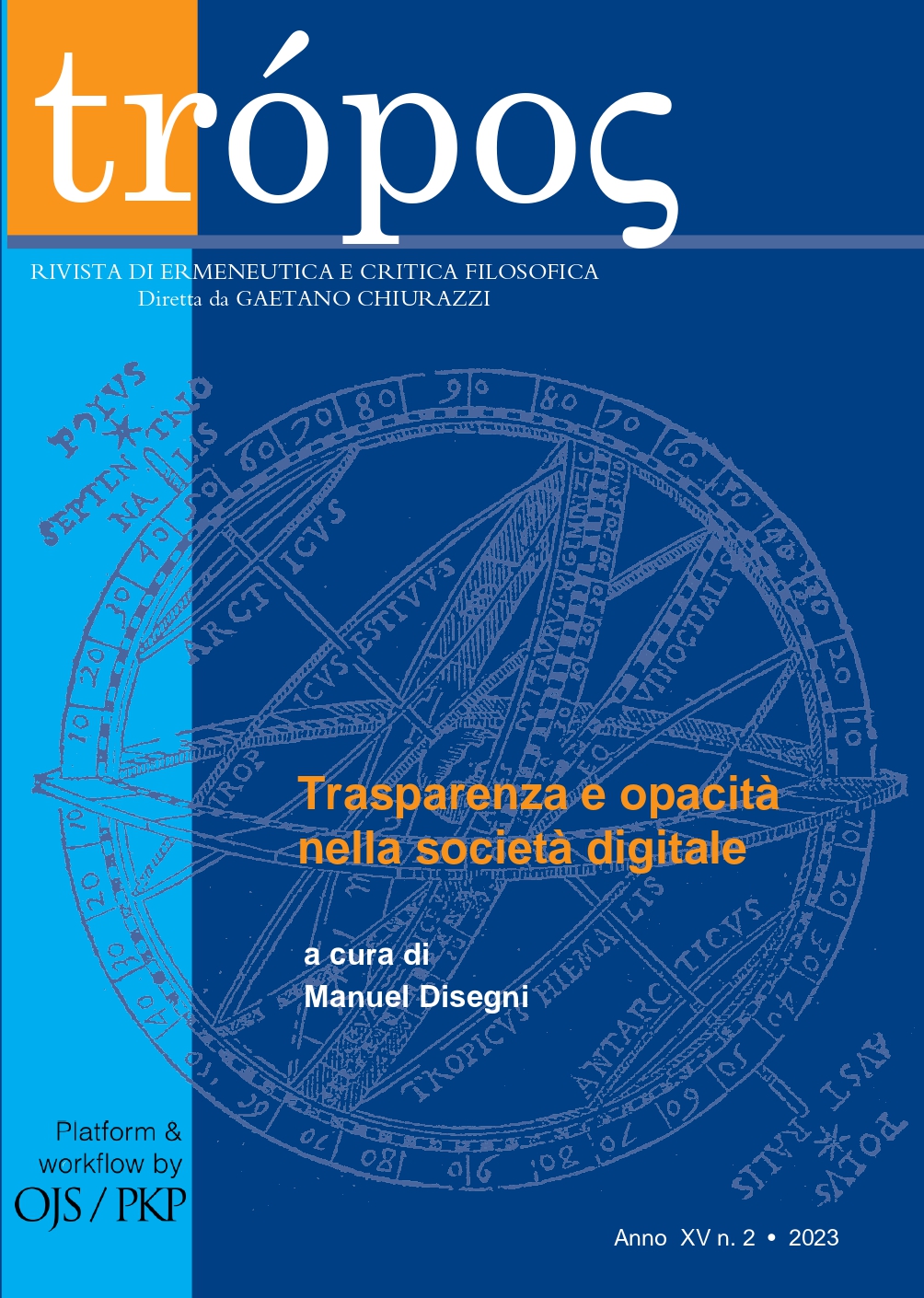
Trasparenza e opacità nella società digitale
Vol. 15 No. 2 (2023)La comparsa e la diffusione delle tecnologie digitali di informazione e comunicazione (ICT) sono state descritte come una ‘quarta rivoluzione’ (Luciano Floridi) facente seguito a quelle inaugurate dalle scoperte scientifiche di Copernico, di Darwin e di Freud. Se nel corso dell’epoca moderna l’umanità ha dovuto rinunciare ad alcune delle più salde certezze che tradizionalmente nutriva sul proprio conto – quella di vivere al centro dell’universo, di avere un’origine e una natura differenti e più alte rispetto a alle altre specie viventi, di essere infine padrona in casa propria e detenere assoluta sovranità sulla propria vita interiore –, nella fase attuale della sua evoluzione sociale essa si vede costretta a deporre anche il proprio primato apparentemente più indisputabile, quello intellettivo, a beneficio dei suoi stessi ritrovati tecnici. In particolare, delle ICT digitali, con il cui potenziale computazionale gli esseri umani non possono più sperare di tenere il passo, dal quale semmai essi dipendono ormai in quasi tutti gli aspetti della loro esistenza in misura crescente. Si tratta di un cambiamento di paradigma tuttora in rapidissimo e imprevedibile corso di dispiegamento dei propri effetti, il quale interroga il pensiero filosofico con gravi ed urgenti questioni di ordine metafisico, etico, politico e sociale. Il presente numero di Tróps. Rivista di ermeneutica e critica filosofica propone di affrontarli nella prospettiva concettuale delineata dalla dicotomia “trasparenza / opacità”.
-
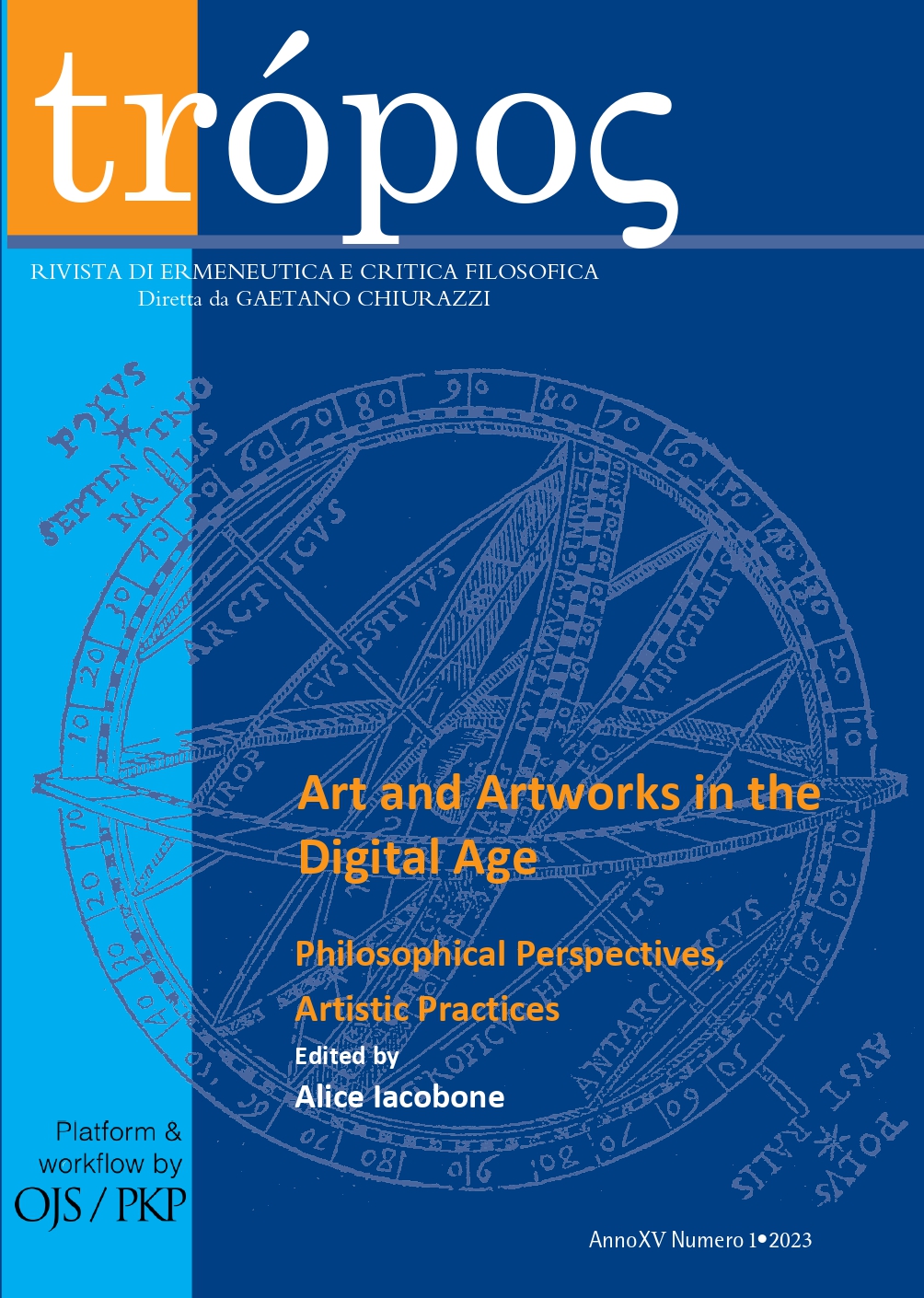
Art and Artworks in the Digital Age. Philosophical Perspectives, Artistic Practices
Vol. 15 No. 1 (2023)The digital age indeed has much to offer to the arts. Digital media provide new tools that can be put to the service of already existing practices, but they also represent an opportunity for developing unprecedented artistic researches and for taking novel theoretical directions. In this sense, the digital allows for the advent of brand-new practices while also coming to concern art as such. Exploring the digital dimension artistically can shed light on its fascinating, exhilarating, uncanny and frightening features; in turn, the arts and their relating categories (such as form, form-taking, image, imagination, creativity, style, performance, just to mention a few) are transformed by the digital and by its inherent possibilities. The papers gathered in this issue of Trópos aim to address the entanglement of the arts and the digital by offering a variety of scholarly perspectives and focusing on a great number of different specific aspects and objects of digitality.
-
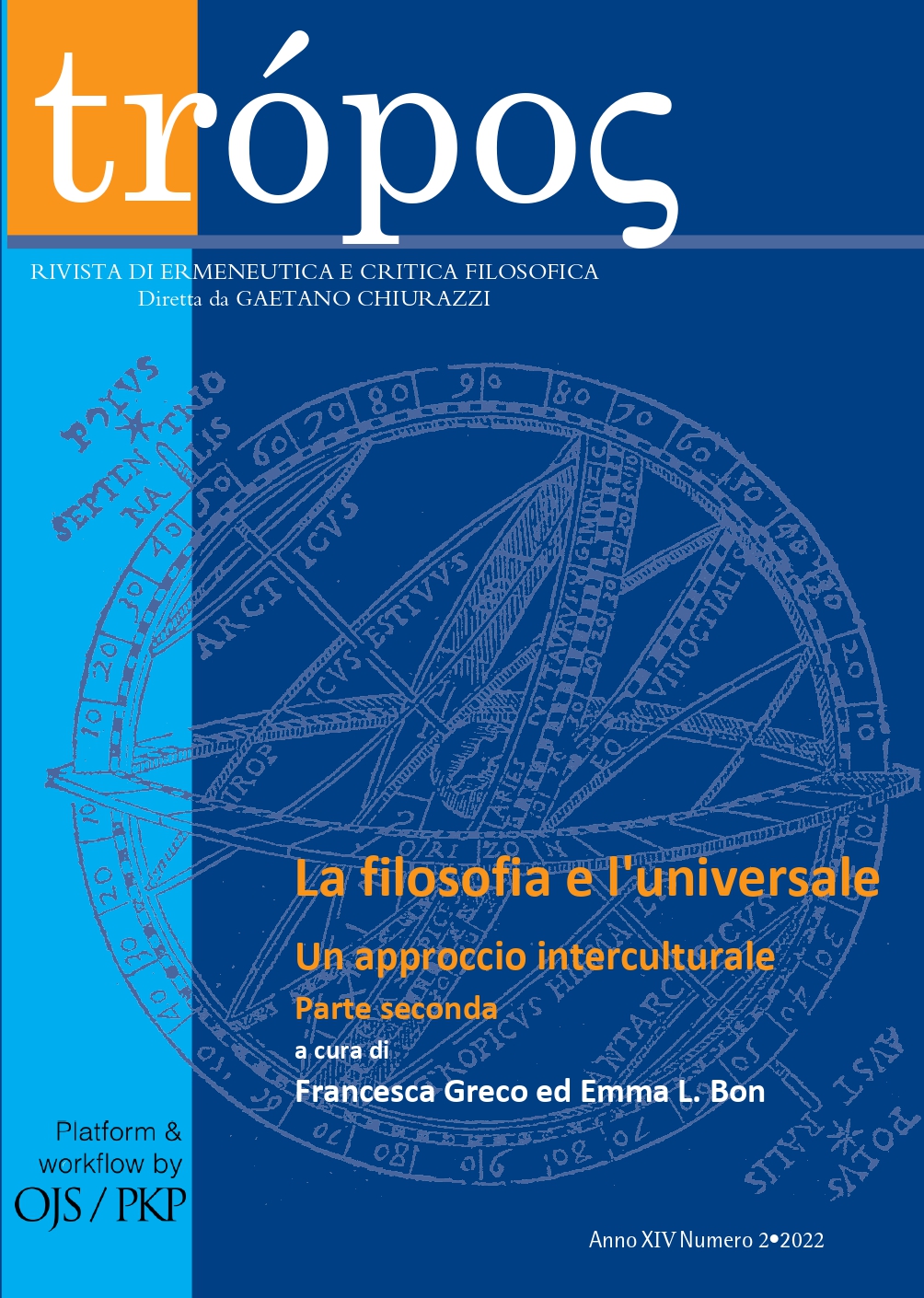
Philosophy and the Universal An Intercultural Approach – Part two
Vol. 14 No. 2 (2022)This double issue of Trópos, of which we present here the second part, is entirely dedicated to the concept of "universal," its historical genealogy, its theoretical performance, and its fruitfulness in a philosophical scenario that, today more than ever, invites us to question ourselves on this issue from a global and intercultural perspective. Indeed, contemporary philosophical debate witnesses an unprecedented opening of horizons: philosophy can no longer ignore – or even deny – the poignancy and relevance of other forms of thought, other cultures, languages, traditions, and places of sense-making. The categories of Western philosophy meet their Other: to what extent can they still be said, assuming this is possible, to be "universal"? The contributions collected in this issue measure themselves against this horizon of questions, exploring their multiple resonances.
-
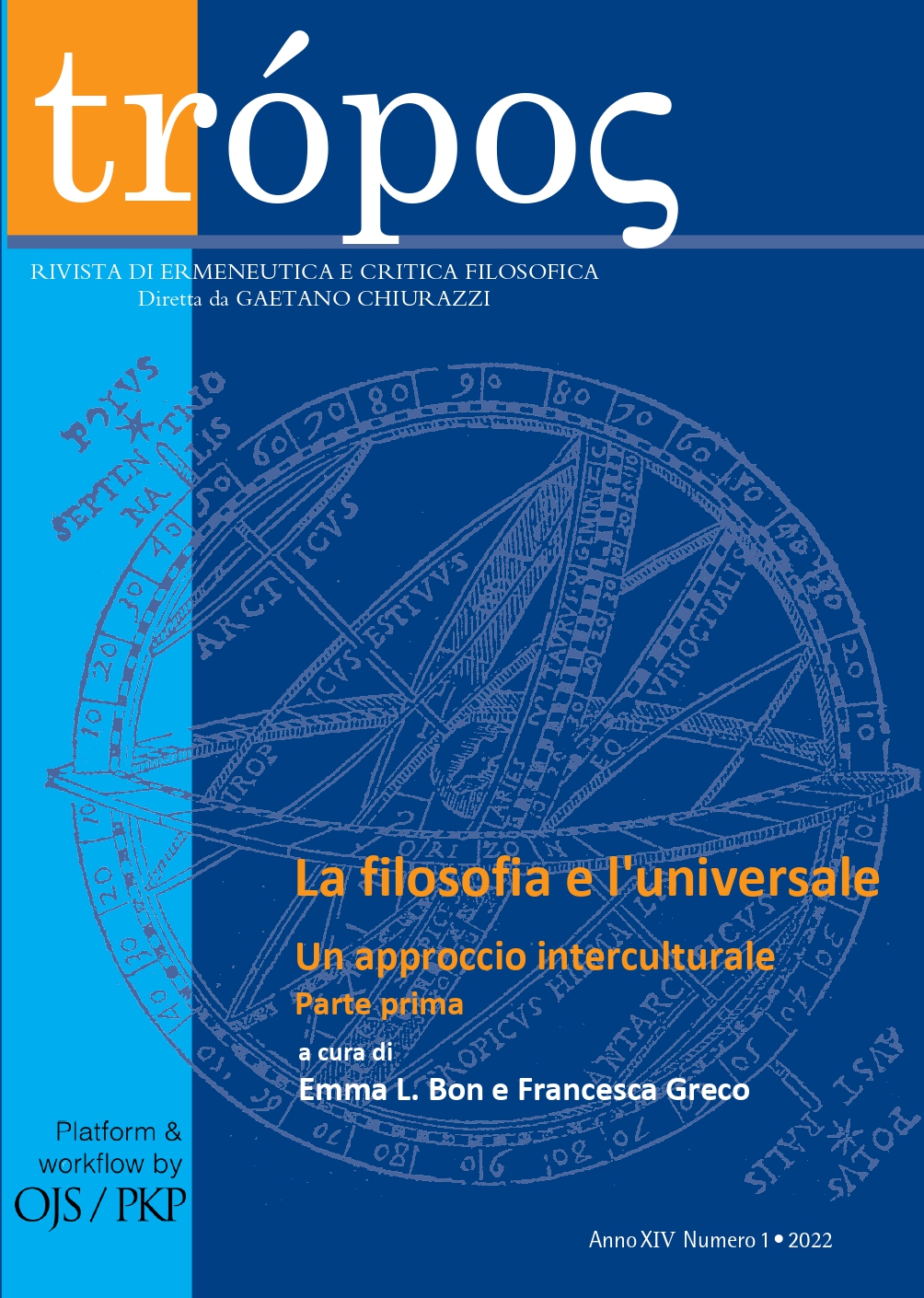
Philosophy and the Universal: An Intercultural Approach – Part one
Vol. 14 No. 1 (2022)This double issue of Trópos, of which we present here the first part, is entirely dedicated to the concept of "universal," its historical genealogy, its theoretical performance, and its fruitfulness in a philosophical scenario that, today more than ever, invites us to question ourselves on this issue from a global and intercultural perspective. Indeed, contemporary philosophical debate witnesses an unprecedented opening of horizons: philosophy can no longer ignore – or even deny – the poignancy and relevance of other forms of thought, other cultures, languages, traditions, and places of sense-making. The categories of Western philosophy meet their Other: to what extent can they still be said, assuming this is possible, to be "universal"? The contributions collected in this issue measure themselves against this horizon of questions, exploring their multiple resonances.
-
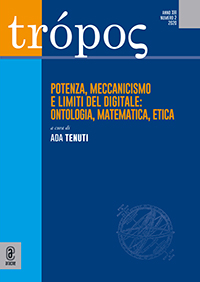
Potenza, meccanicismo e limiti del digitale: ontologia, matematica, etica
Vol. 13 No. 2 (2020)La pervasività della “ragione algoritmica” tra le avanguardie della ricerca scientifica, come nella sfera pubblica, spiega la rilevanza di una riflessione sui metodi computazionali di accesso e modellizzazione del reale nel discorso epistemologico e filosofico contemporaneo. Questa riflessione assume la forma di una ricognizione sui limiti della digitalizzazione e dell’aritmetizzazione del reale promosse dall’ontologia digitale su cui poggiano le “filosofie numeriche”. Voci provenienti da diversi ambiti disciplinari forniscono uno spettro di prospettive teoriche da cui captare le premesse implicite e le possibili conseguenze di questo modo di fare scienza. Nella convinzione che questioni di questo calibro vadano affrontate da discorsi variegati, consapevoli delle loro traduzioni in pratiche che impattano tanto sul futuro della ricerca quanto sulle forme della cittadinanza.
-
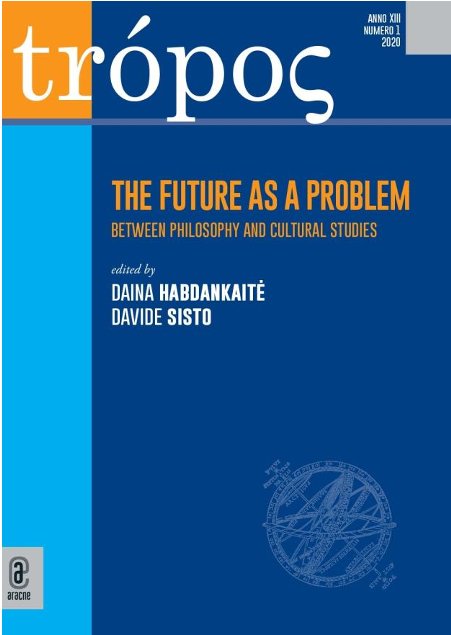
The Future as a Problem. Between Philosophy and Cultural Studies
Vol. 13 No. 1 (2020)What can philosophy say about future and what is future of philosophy itself? This issue deals with the problematic nature of futurity on ontological, epistemological, ethical, and aesthetical levels. From analyzing the contemporary takes on the future to re-evaluating classic and modern traditions of thought about what is to come, the contributors engage in a rigorous discussion which often calls for an interdisciplinary approach as well as urges for openness of thought. Although different in their topics, objects, and methodology, the contributions to this special issue prove once again that raising the question of the future in philosophy leads to rethinking the future of philosophy itself, be it in the form of novel philosophical movements or in re-conceptualizing the traditional ones.
-
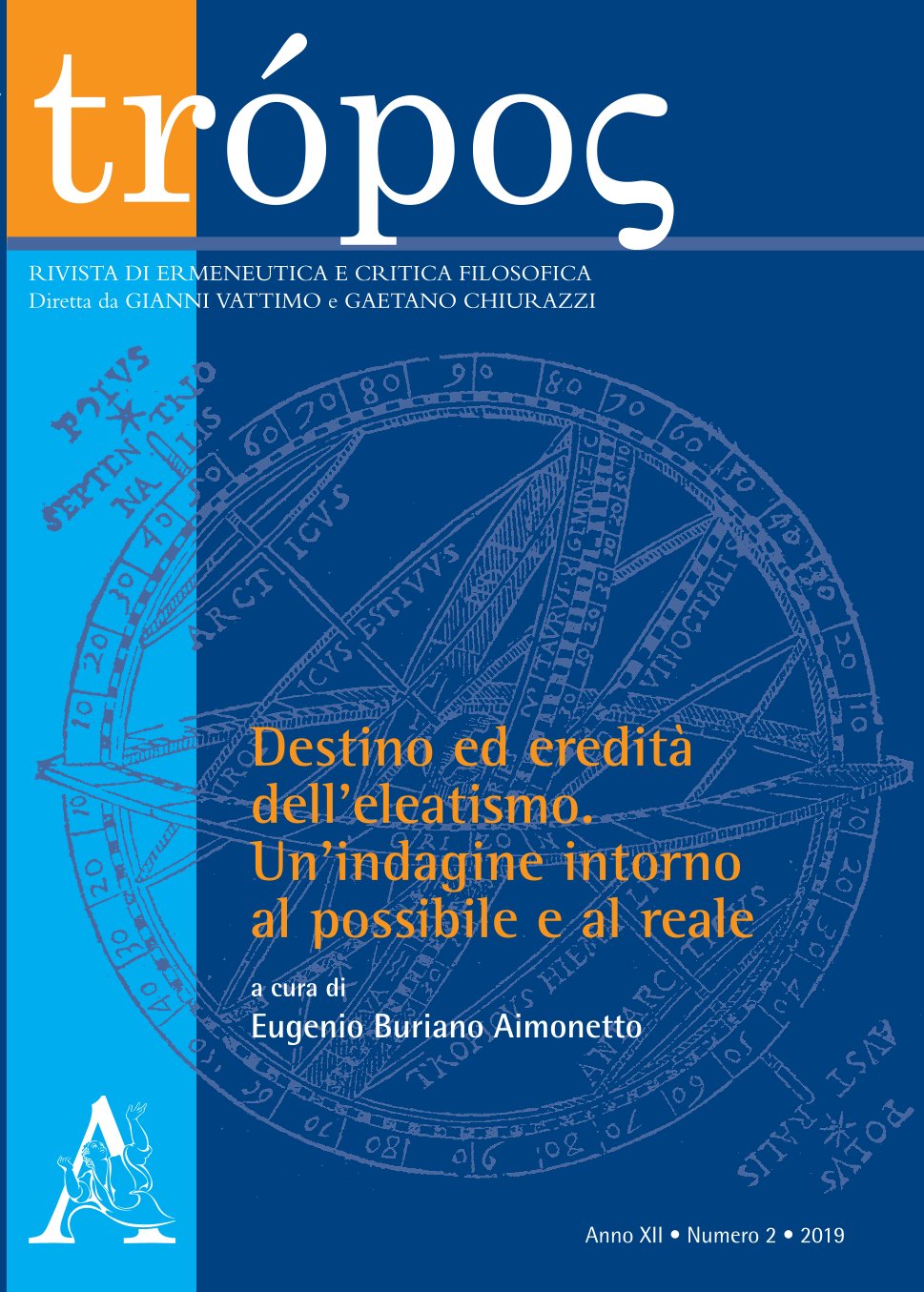
Destino ed eredità dell'eleatismo. Un'indagine intorno al possibile e al reale
Vol. 12 No. 2 (2019)Pur in diversi momenti storici assai distanti fra loro, la tradizione filosofica occidentale ha intrattenuto con Parmenide un rapporto travagliato, a tratti esplicitamente conflittuale, con il comune intento di osteggiare la presunta pretesa autocratica di un pensiero totalizzante, insensibile alla varietà proteiforme che popola il mondo. Pur nel tentativo di restituire consistenza ontologica alla molteplicità, non pochi autori si sono tuttavia resi conto dell'inconfutabilità della sentenza eleatica, restituendola immutata. Il volume raccoglie contributi eterogenei che ripercorrono l'aporia appena accennata, affrontando altresì tematiche collaterali strettamente implicate, tra cui la relazione finito/infinito, identità/differenza, libertà/necessità. Da essi traspare una vividezza comune, un'effervescenza creativa che con ragione, come alcuni degli autori si sforzano di comprovare, potrebbe dirsi eleatica a discapito dell'usuale vulgata che stigmatizza il parmenidismo come un sistema claustrofobico, immotivatamente votato a un quietismo cadaverico.
-
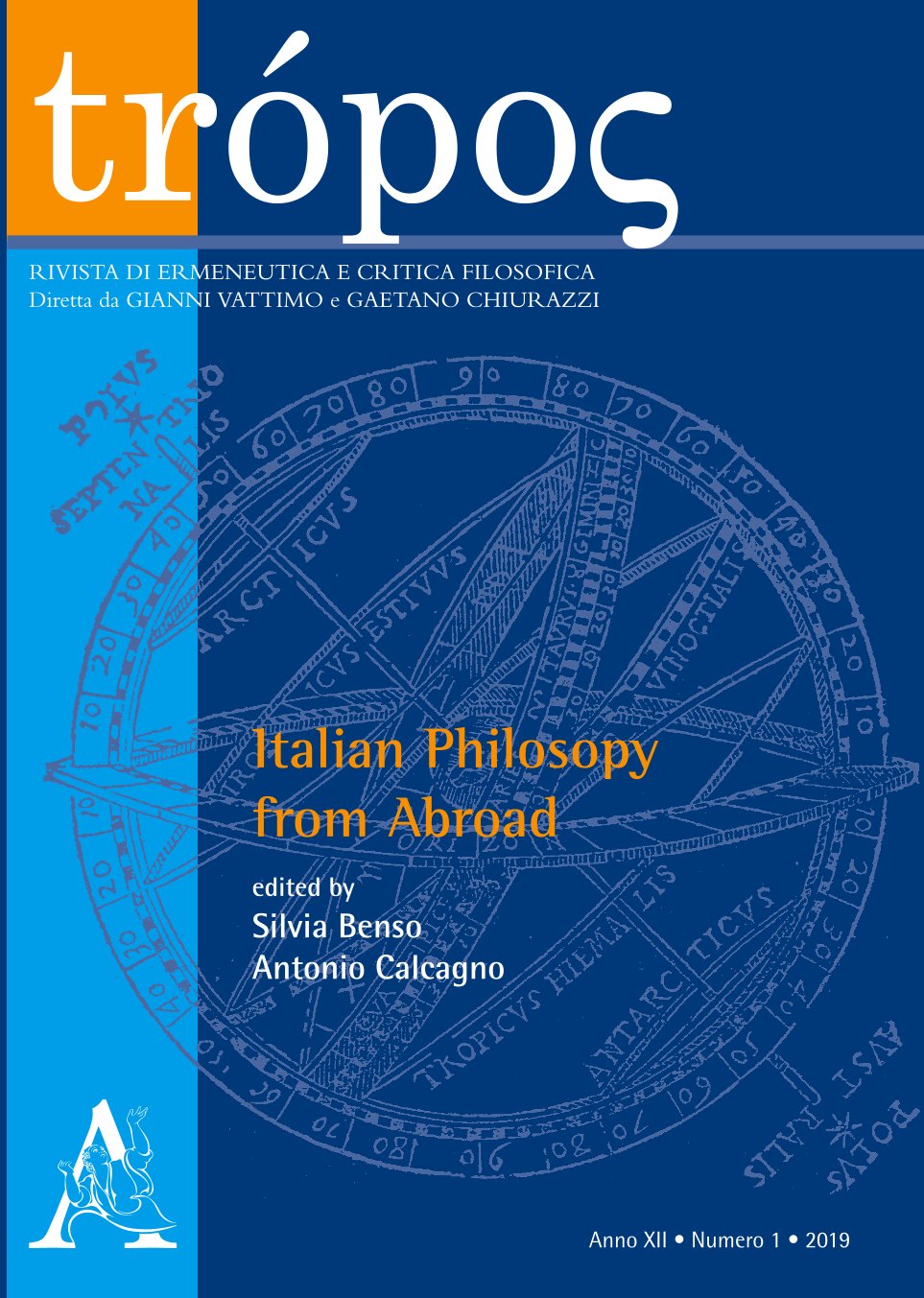
Italian Philosophy from Abroad
Vol. 12 No. 1 (2019)The past few years have attested to the emergence of a new area of interest among scholars of continental thought, namely, the increased presence and popularity of Italian philosophy. Due in part to linguistic barriers, much of the philosophical work of Italian thinkers has remained largely unknown outside of Italy, accessible to and accessed by only a small number of specialized scholars. To remedy in part this situation, the Society for Italian Philosophy (SIP: https://www.societyforitalianphilosophy.org/) was founded approximately four years ago outside of Italy, on the North-American continent, with the primary goal of promoting Italian thinking, broadly understood as consisting of both its historical content and its more recent expressions. The essays gathered in this volume of Trópos comprise a sample of the work carried out by SIP and represent, for the most part, work done outside of Italy, which now comes back into the Italian scholarly context, thereby facilitating a dialogue across oceans and testifying to the international movement what is Italian philosophy today.
-
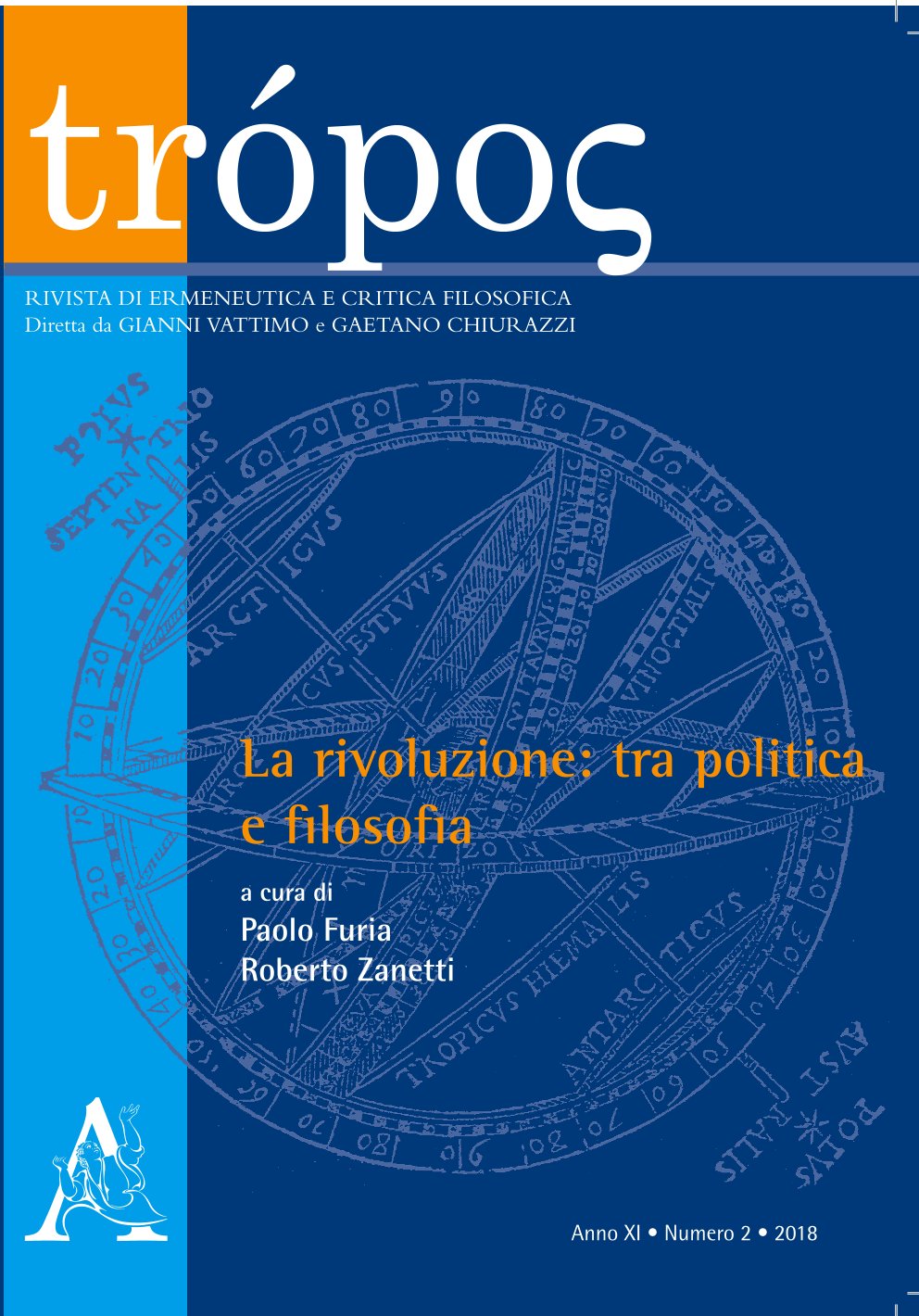
La rivoluzione: tra politica e filosofia
Vol. 11 No. 2 (2018)Il volume è dedicato al concetto di rivoluzione. Si tratta di ricostruirne il significato teorico e le sue molteplici sfumature. La modernità è stata più volte definita dalle sue rivoluzioni: la rivoluzione industriale o la rivoluzione francese. Ma è possibile sovvertire la continuità temporale e interrompere il flusso della storia per creare qualcosa di radicalmente nuovo?
-
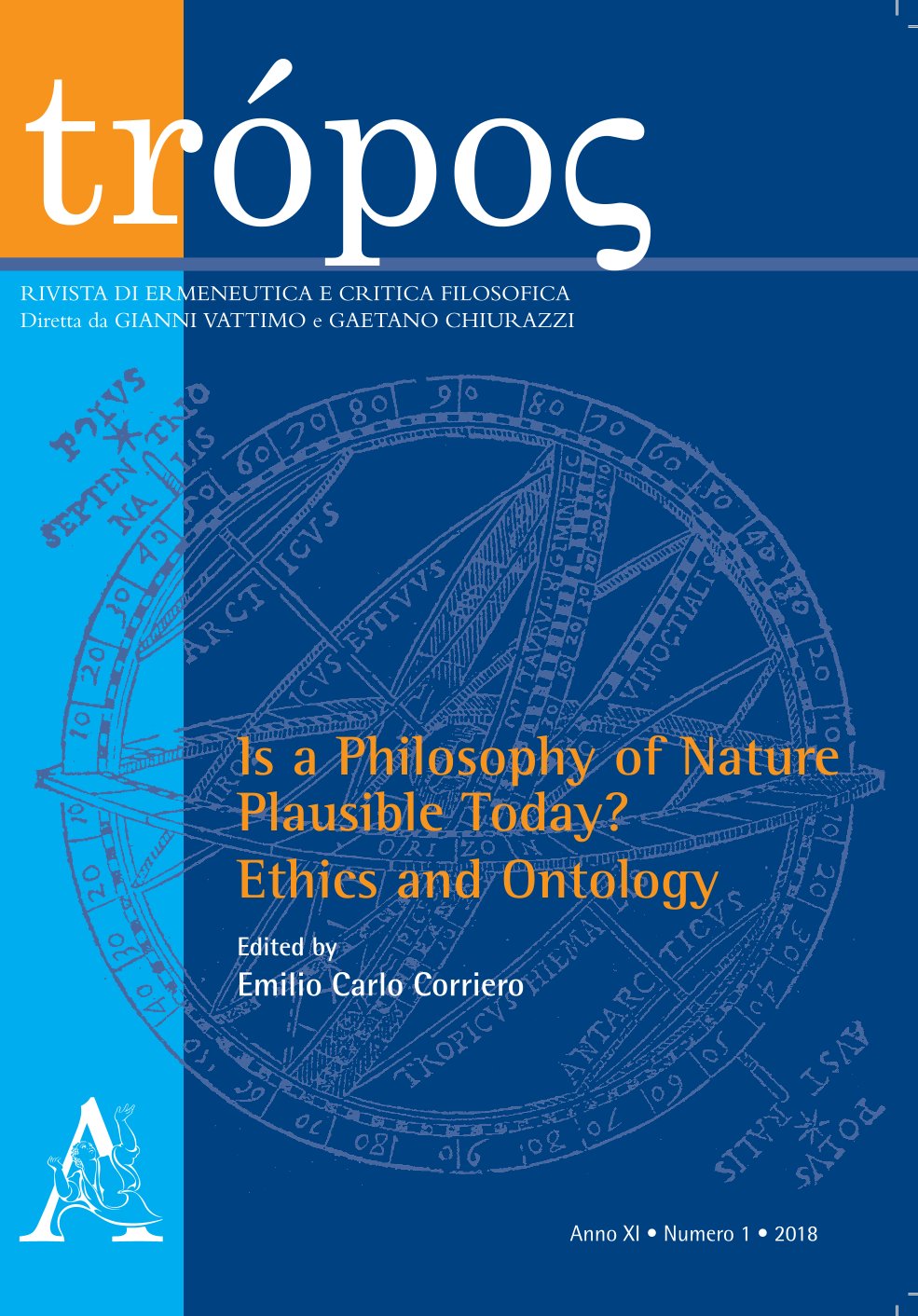
A Philosophy of Nature Today? Ethics and Ontology
Vol. 11 No. 1 (2018)The philosophy of nature can only be linked to scientific knowledge and its most recent results, but, as it is primarily philosophy, it requires further reflection on its theoretical foundations, on the particular status of the discipline as well as on the particular character of its object, nature. A philosophy of nature that presents itself at the same time as a metaphysics of nature (bringing together the complexity of scientific knowledge) and as a ‘transcendental’ reflection on the grounding of being in general is capable of establishing a systematic vision of knowledge that presents solutions in the ethical field too. But in what way can a philosophy of nature provide an answer to the fundamental questions of ethics without risking any form of reductionism? Is there room for freedom within a contemporary philosophy of nature? And what would it entail?
-
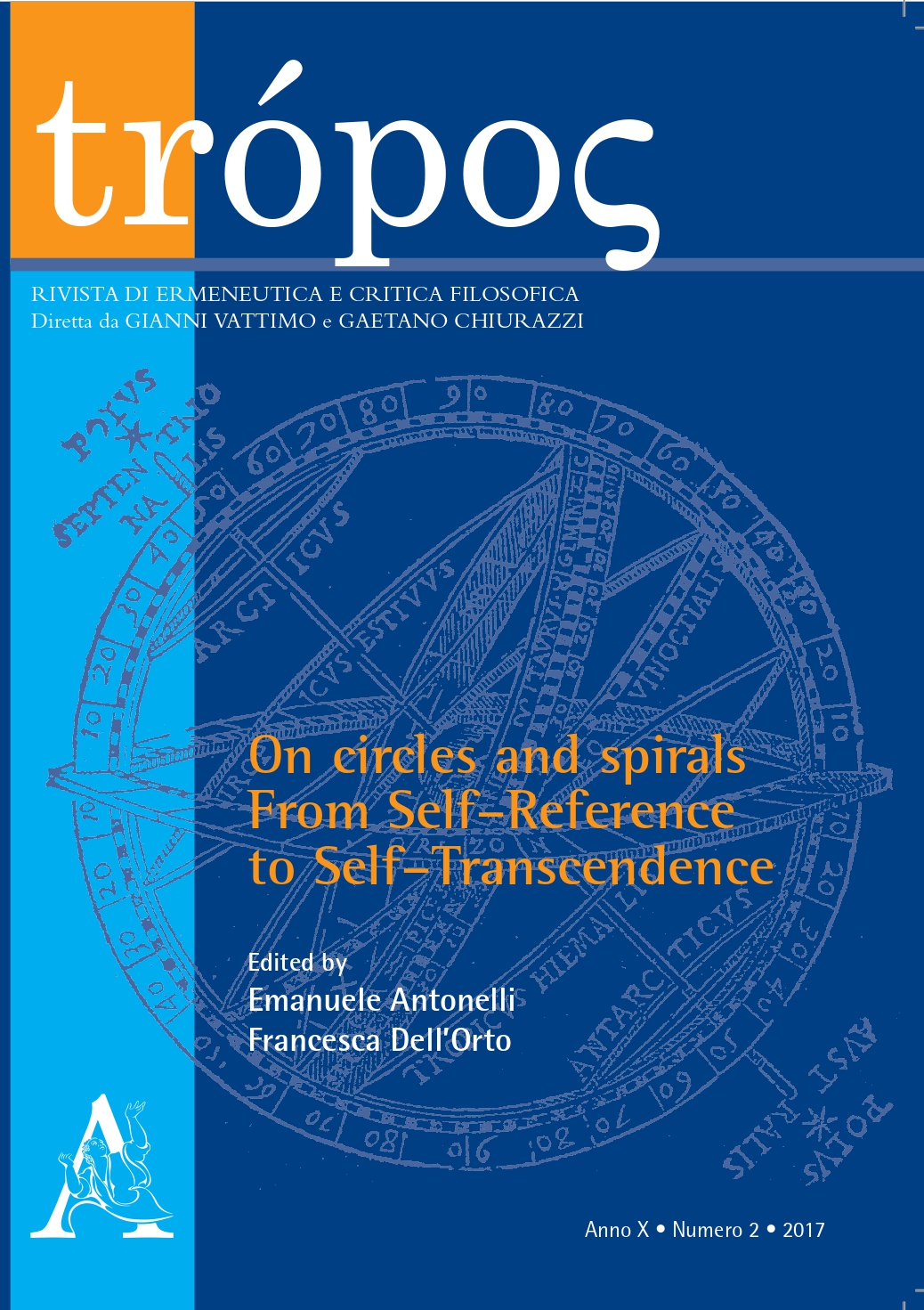
On Circles and Spirals. From Self–Reference to Self–Transcendence
Vol. 10 No. 2 (2017)Whereas self–reference is primarily studied in the context of philosophy of language, this volume attempts to show how it encompasses very traditional questionings in the history of continental philosophy from its beginning and all along its most crucial turning points. Every time philosophy has looked for causes, both on an ontological and an epistemological plane, it has ultimately faced the phantom of the infinite regress, the ramification of the supposed linearity, and the loss of the origin. The circularity of self–reference is itself the expression of a fundamental indetermination and seems to sanction an impassable boundary for thought. We tried to challenge this sentence by discussing some very implications of self–reference, some of its occurrences, and, if needed, recasting its definition to the extent of shift-ing the connected idea of aporetic reflexivity to that of self–transcendence, where the prefix “self” stops to make allusion to the selfhood of an idem and points at the dynamic processuality of a complex system.
-
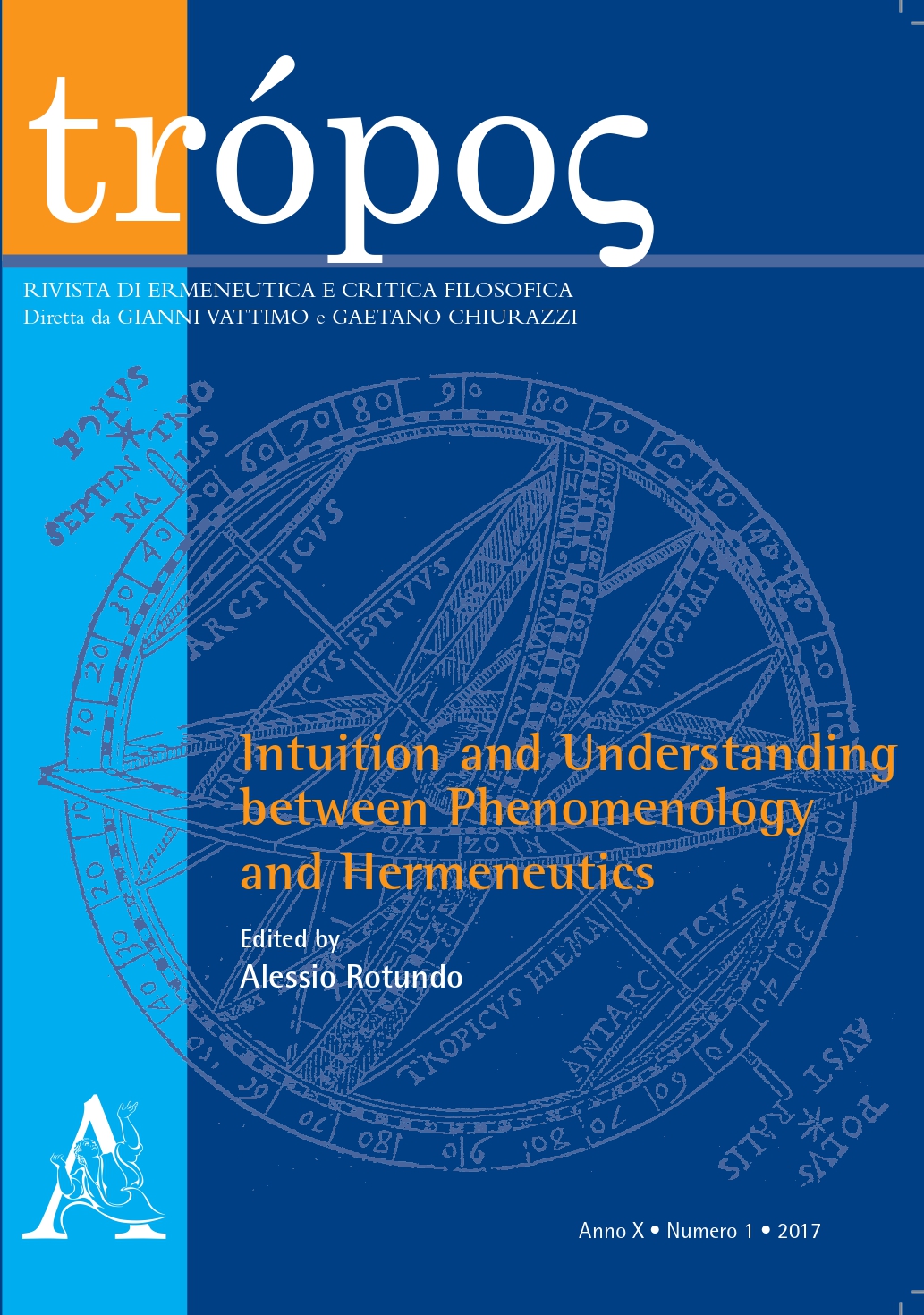
Intuition and Understanding between Phenomenology and Hermeneutics
Vol. 10 No. 1 (2017)Can we still validly study the notions of “intuition” and “understanding”? Do the shifts in meaning to which these words have been subject exclude a renewed attempt to look for the unitary meaning that may subtend their various uses? For instance, in Latin, the word “intuition” comes from the verb intuèri, which alludes to the domain of visual perception (tuèri literally means “to look at”). On the other hand, as Gadamer reminds us in Truth and Method, “understanding” expresses the idea of relation to another, meaning that has its source in the legal domain. Indeed history has charged these terms with ever richer meaning; on the other hand, however, can the ultimate signification of each of these terms be understood without referring to what has always been intended by those who use these words?
The present volume aims to offer a renewed attempt to think the notions of intuition and understanding in the context of phenomenological and hermeneutical analysis. The volume aims thereby also at highlighting common traits and distinguishing characteristics of the two philosophical currents in their approaches and conceptualization of these two ideas.
-
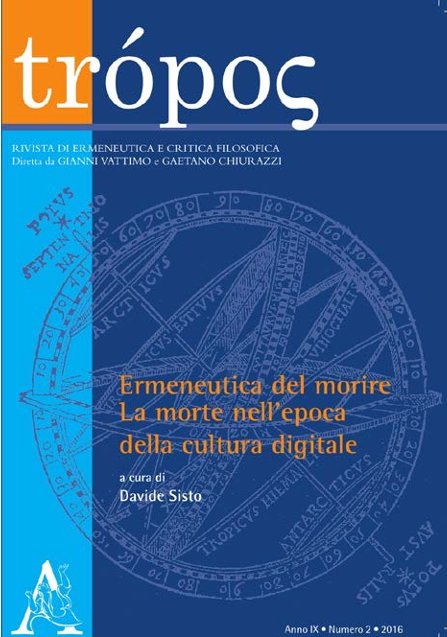
Ermeneutica del morire. La morte nell’epoca della cultura digitale
Vol. 9 No. 2 (2016)Il fascicolo affronta i cambiamenti che la cultura digitale e il post–umano hanno apportato alla nostra esperienza della morte e dell’immortalità. Da una parte, si sofferma sul paradosso che concerne il morto, vale a dire l’incarnazione della presenza di un assente, in riferimento alla fotografia, alla Digital Death e alla figura metaforica dello zombie. Da un’altra, invece, si concentra sulle conseguenze sociali delle teorie immortaliste del transumanesimo e delle trasformazioni del “memento mori” all’interno del conflitto attuale tra culture differenti. L’obiettivo è un’ermeneutica del morire, capace di offrire ai Death Studies un contributo rilevante per comprendere come la nostra società stia mutando.
-
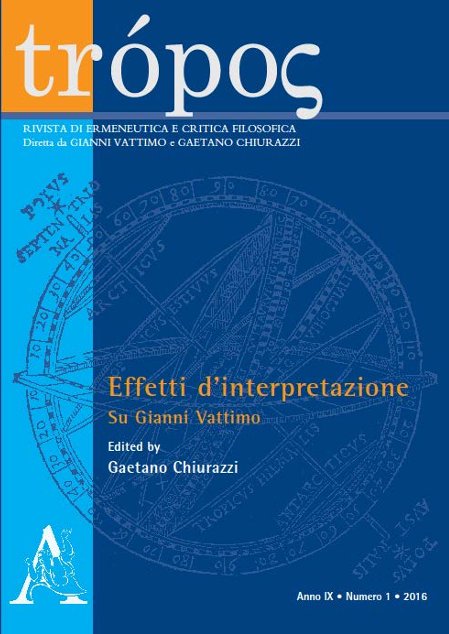
Effetti d’interpretazione: su Gianni Vattimo
Vol. 9 No. 1 (2016)Il presente volume di Tropos è dedicato al pensiero di Gianni Vattimo, in occasione dei suoi 80 anni, e prende spunto da un convegno tenutosi a Torino il 16 e 17 marzo 2016. I saggi qui pubblicati offrono un punto di vista, per quanto necessariamente limitato ma, riteniamo, significativo, degli effetti che la filosofia di Vattimo ha avuto, e ancora ha, sul dibattito filosofico contemporaneo. In particolare, si è voluto cercare di cogliere questi effetti dal punto di vista della sua ricezione internazionale e toccando differenti temi. Ne deriva uno spaccato che non solo ripercorre la produzione di Gianni Vattimo, focalizzandosi su alcuni suoi momenti fondamentali, ma che ci offre una panoramica del modo in cui tale pensiero, attraverso mediazioni che certamente fanno parte delle peculiarità tipiche dei Paesi di provenienza dei vari autori, è stato ed è attualmente recepito
-
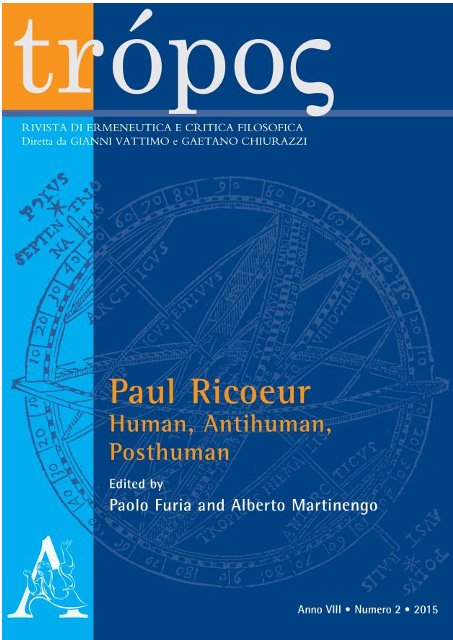
Paul Ricoeur: Human, Antihuman, Posthuman
Vol. 8 No. 2 (2015)Ten years after Paul Ricoeur’s death, Trópos discusses the main issues of his thought. Seven contributions deal with Ricoeur’s philosophy of the “human” from different perspectives. Starting from his hermeneutical turn in the 60’s, the contributions retrace Ricoeur’s long way toward a post- metaphysical approach to subjectivity. The aim is to investigate its resources facing new challenges: among others, the reflections on animality, the debates on the posthuman era, the issues concerning the digital identity.
-
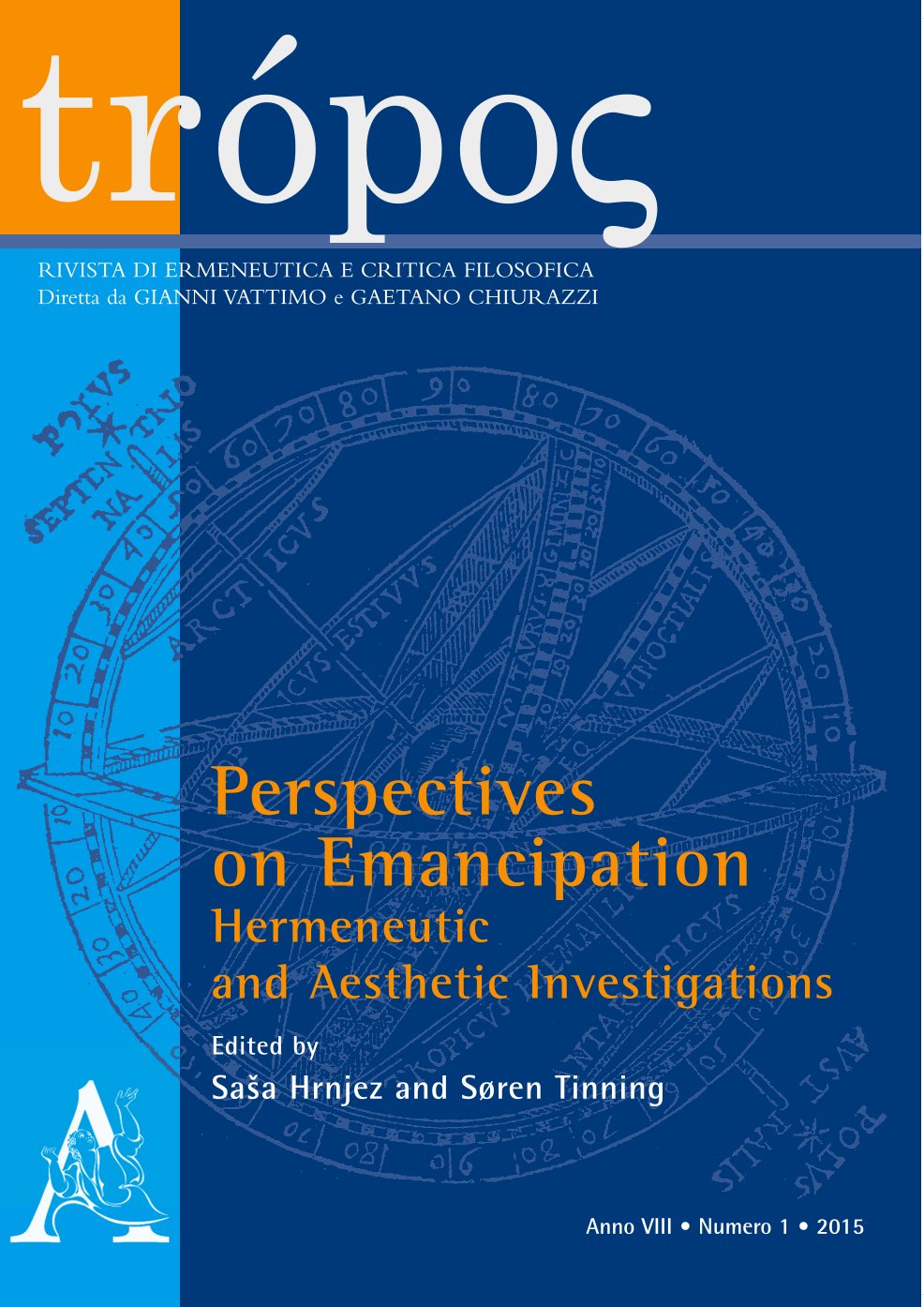
Perspectives on Emancipation: Hermeneutic and Aesthetic Investigations
Vol. 8 No. 1 (2015)What does “emancipation” mean today? A hermeneutical approach to this question tries above all to investigate the significance of emancipation in relation to human praxis. Since capitalist societies today prompt the rethinking of emancipatory practices, this volume sets the task to examine the topic of emancipation through a dialogue between different hermeneutical and aesthetical inquiries, while also opening for broader philosophical discussions of the main question here: “what does it mean for us to emancipate ourselves today?”. Taking the lead from central hermeneutical concepts such as plurality, praxis, non–foundational rationality, history, and the Other, the contributions engage with many different philosophical disciplines as well as philosophical currents.
-
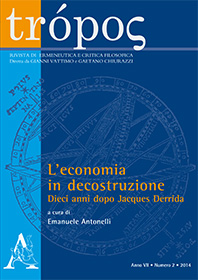
L’economia in decostruzione. Dieci anni dopo Jacques Derrida
Vol. 7 No. 2 (2014)A dieci anni dalla morte di Jacques Derrida, nel mezzo della più grave crisi economica e finanziaria della storia del capitalismo europeo, Trópos. Rivista di Ermeneutica e Critica Filosofica propone un numero di commemorazione attiva per provare a riflettere sul fatto economico attraverso la decostruzione. Derrida ha dedicato molte riflessioni interessanti a soggetti economici classici, quali la moneta, l’interesse, la speculazione; ha inoltre investigato temi che, pur essendo ai margini della disciplina determinata, rappresentano materia di interesse centrale per le scienze sociali, quali per esempio la relazione tra economia ristretta e generale. Non da ultimo, ha partecipato in maniera determinante al dibattito in merito alla galassia semantica e tematica del dono. Della varietà e ricchezza delle questioni aperte dall’accostamento tra economia e decostruzione i saggi qui presentati offrono una panoramica certamente non esaustiva: essi vogliono essere uno stimolo per aprire una più ampia discussione su un aspetto del decostruzionismo che, anche se considerato spesso marginale e di conseguenza ancora in grande misura inesplorato, costituisce nondimeno uno dei campi in cui più concretamente si esplica quel che Derrida chiamava “différance”. La quale è infatti, così scriveva nel testo dedicato a questo concetto, la struttura generale dell’economia.
-
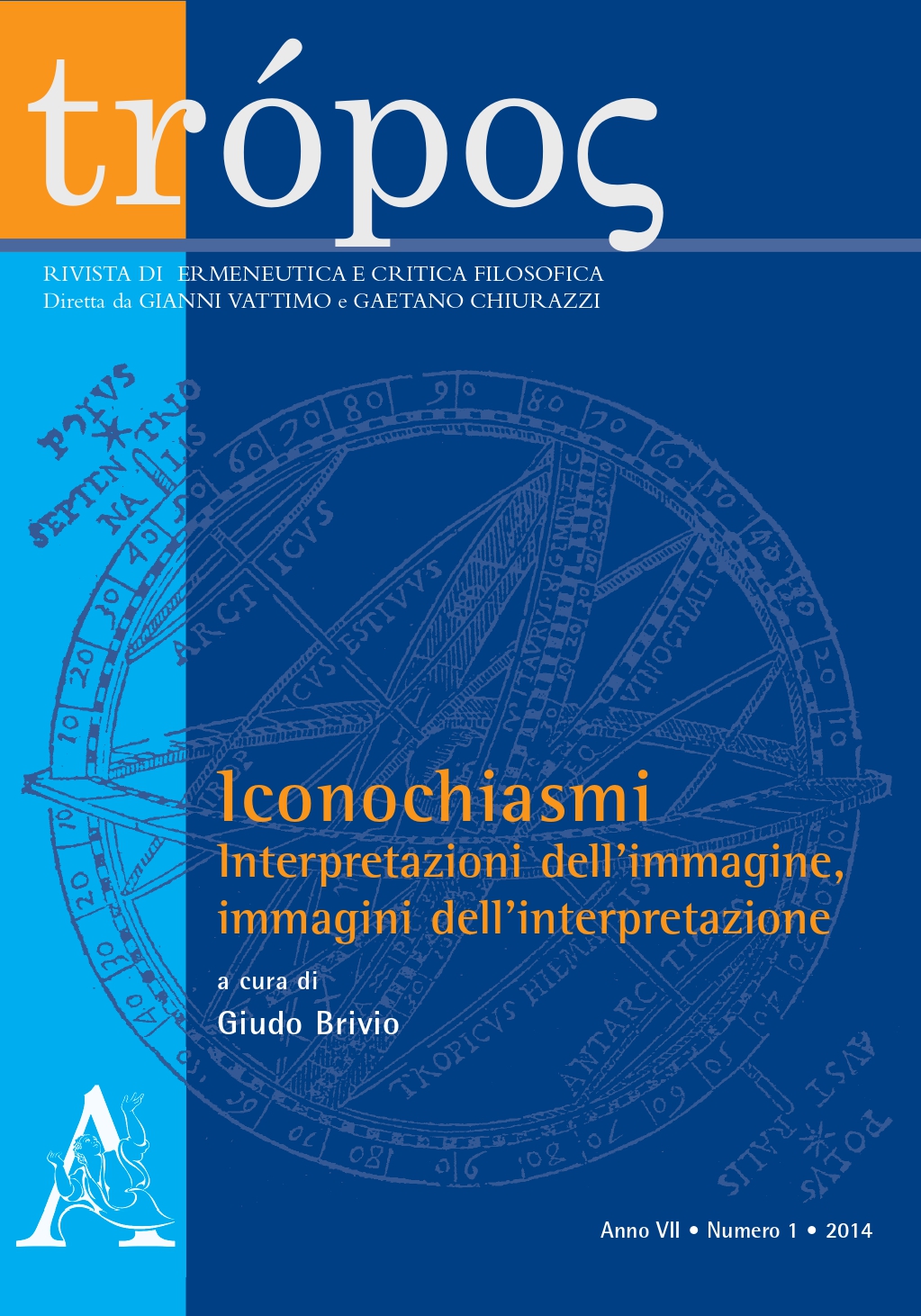
Iconochiasmi. Interpretazioni dell’immagine, immagini dell’interpretazione
Vol. 7 No. 1 (2014)Se le immagini, un po’ come gli armoire à glace proustiani, hanno la caratteristica peculiare di essere gli unici oggetti in grado di riflettere altri oggetti, da quale posizione dovremo collocarci per poterli osservare? Questi enti dallo statuto speciale, attraverso cui va oggi innanzitutto e per lo più – e forse sempre più - il nostro rapporto col mondo, lanciano una sfida ininterrotta alla filosofia dell’interpretazione. Ripensare il regime delle immagini alla luce degli sviluppi attuali della teoria dell’interpretazione e rideclinare l’ermeneutica attraverso il confronto con il mondo delle immagini, in un gioco di specchi tutt’altro che metaforico, può costituire una sfida e una pietra di paragone, oggi, per l’ermeneutica come per la civiltà dell’immagine
-
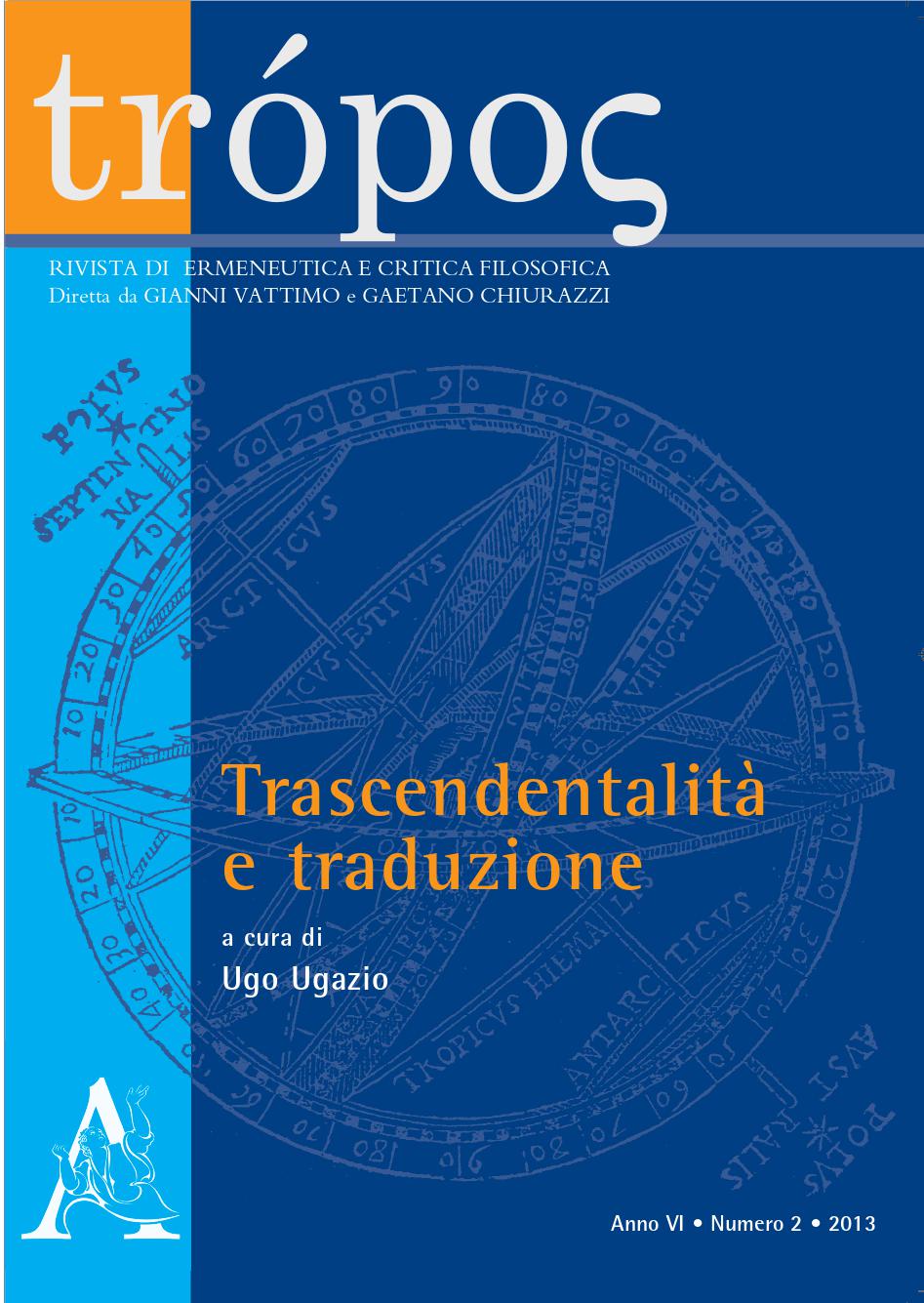
Trascendentalità e traduzione
Vol. 6 No. 2 (2013)Il fascicolo contiene alcuni dei contributi presentati nel corso del convegno Trascendentalità e traduzione. Di che cos’è traduzione l’esperienza? svoltosi a Torino il 24 e 25 maggio 2012. Il campo trascendentale non è certamente l'ambito delle scienze pure, della logica o della matematica formali; non è però nemmeno l'ambito della scienza della cultura, la commistione dei saperi che determina in qualche modo la migliore delle epistemologie possibili. All'inizio della modernità, tra Cartesio, Hume e Kant, la filosofia ha rivendicato a sé un ambito proprio della fondazione che, per così dire, confina da una parte con la scepsi radicale e dall'altra con la metafisica. Tanto i pensatori dell'idealismo tedesco (qui considerati nei contributi di Klaus Vieweg, di Gaetano Rametta e di Davide Sisto) quanto i critici della fenomenologia trascendentale ( qui considerati nei contributi di Pierre Montebello, di Dimitri Ginev e di Roberto Terzi) hanno visto nei limiti posti dalla «filosofia trascendentale» l'ostacolo che avrebbe pregiudicato l'accesso alla «vita». L'impianto delle categorie previsto da Kant non avrebbe potuto coincidere con i limiti posti dalla ragione, né all'esistenza umana avrebbe potuto essere negato il ruolo avventuroso di una ricerca imprevedibile: le sei prospettive qui illustrate, per quanto difficilmente conciliabili, concordano en retour sul «trascendentale» da cui provengono.
-
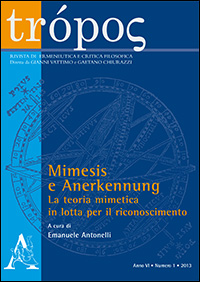
Mimesis e Anerkennung. La teoria mimetica in lotta per il riconoscimento.
Vol. 6 No. 1 (2013)A circa mezzo secolo di distanza dalla pubblicazione di Mensonge romantique et vérité romanesque, punto di scaturigine della teoria mimetica, la riflessione di René Girard e dei suoi estensori si è consolidata ed estesa oltre i confini disciplinari ai quali apparteneva la sua prima occorrenza ed è pronta a vestire i panni dell’araldo di una nuova stagione delle sciences de l’homme; ancora negletto e spesso scansato con timore ostracizzante, il pensiero di René Girard richiede oggi più che mai di essere preso sul serio. L’invito e l’auspicio così espressi indicano implicitamente il campo del confronto che, in una sorta di intima coerenza tra il contenuto e la forma, vedrà la mimesis fare i conti con il riconoscimento (Anerkennung). Riflettendo sull’incontro tra queste due nozioni, gli autori riuniti a convegno danno vita ad un intreccio di prospettive che offre alla teoria mimetica un importante banco di prova. I concetti attorno a cui ruota il volume forniscono da un lato il pretesto per istituire un confronto ragionato e argomentato, portato avanti con spirito combattivo, serietà e rispetto, tra le tesi fondanti dell’ormai consolidato paradigma mimetico e la grande tradizione della teoria del riconoscimento; dall’altro, si prestano a soddisfare l’esigenza schiettamente filosofica di indagare i rapporti non sempre evidenti che legano una nozione già entrata nel dibattito pubblico e nel gergo comune ed una in procinto di imporsi.
-
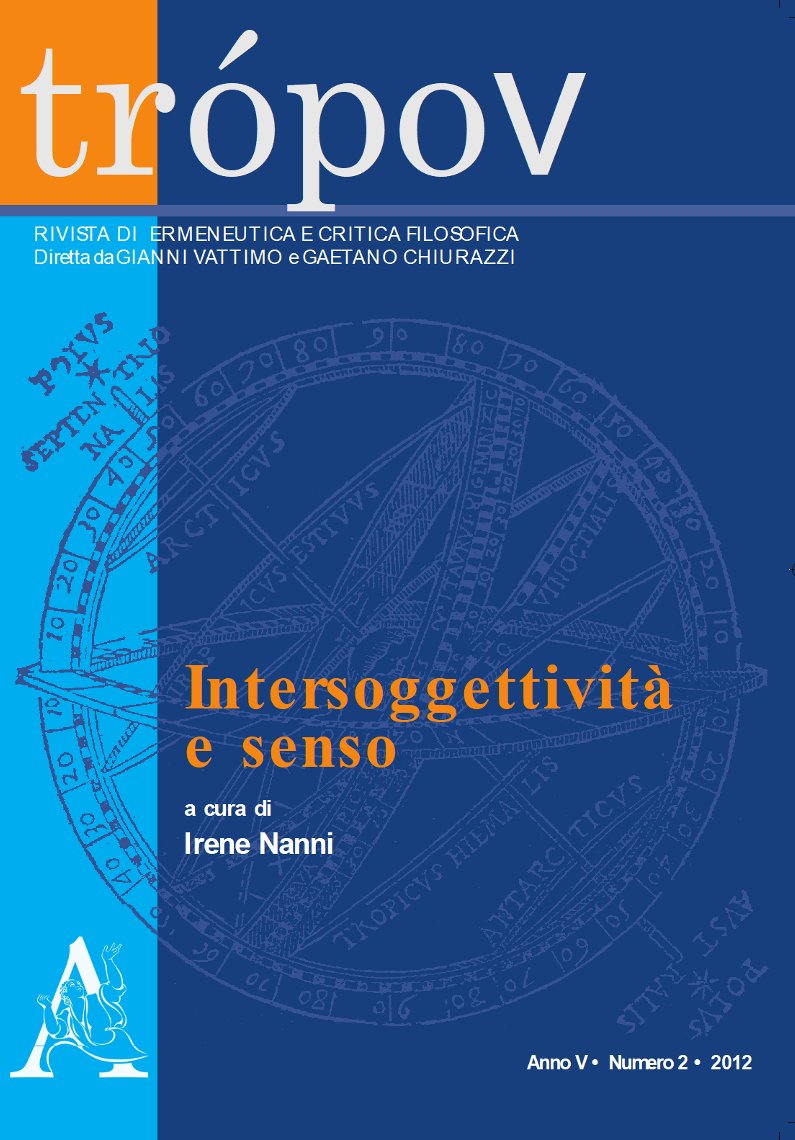
Intersoggettività e senso
Vol. 5 No. 2 (2012)Trópos dedica questo fascicolo al problema del senso e dell’intersoggettività. I contributi raccolti interrogano il concetto di senso, e la sua genesi, alla luce degli sviluppi della fenomenologia post-husserliana. Genesi del mondo e autocostituzione dell’io sono un’unica e indissociabile storia? Se l’alterità intra - e intersoggettiva della vita del sé diventa il motore del senso, in che modo questo movimento che muove dal sé verso l’altro che è in noi può dispiegare l’orizzonte ontologico-semantico del soggetto, la sua storicità, restituendocene al contempo l’accesso?
È qui in gioco la riformulazione della natura individuale e collettiva del senso: ne emerge un quadro complesso, un nuovo paradigma semantico a-soggettivo o, meglio, trans-soggettivo, le cui modalità restano da stabilire.


